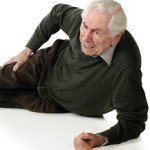
Preventing Falls
“Pride comes before a fall”. More often than not far more than just pride is lost following a fall for someone elderly.
A fall resulting in a broken hip for someone over 80 may result in death caused by postoperative complications.
Less drastic is the loneliness and isolation caused by a lack of confidence. Half of all older people suffering a hip fracture are no longer able to live independently.
One in three people aged 65 or over fall each year, that’s 3.4 million at huge cost to taxpayers for NHS and social care services.
“Prevention is better than cure.”
Many falls are preventable so why do older people fall and what can we do to reduce or prevent the likelihood of this happening?
- Muscle strength and balance play a huge part in fall prevention with an estimated 1 million fewer falls had this been maintained. Did you know we lose an estimated 30% of our muscle strength between the ages of 50-70 ?
- Encourage a minimum of 150 minutes vigorous exercise per week; gardening, brisk walking and Tai Chi are all good for strength, balance and agility. Dancing has been proven to be the best all round form of exercise so cancel the gym and get your dancing shoes on.
- Visual impairments cause falls, regular eyesight tests, appropriate glasses and treatments help.
- Deafness and ear infections can really affect someone’s balance too.
- Poor lighting – eyes of people aged over 60 need three times more light than those of a 20 year old.
- Medication, many prescription drugs increase the risk of a fall including those in the diazepam family, antipsychotics, antidepressants, drugs to treat Parkinson’s disease and some used to treat cardiovascular disease.
- Poorly fitting footwear, loose slippers and untied laces or a shuffling walk. Encourage an elderly person to lift their feet higher off the ground.
- Syncope – temporary loss of consciousness due to a fall in blood pressure.
- Cognitive decline such as people with Dementia and Parkinson’s disease significantly reduce the risk of a fall
- Generalised frailty, a recognised condition of being elderly
- Loose floor coverings. Ensure all rugs are safe and carpets are smooth
- Loose wires and cables, make sure they are hidden safely
- Handbags. Keep them off the floor
- Dehydration causes falls- help maintain good fluid intake
- Encourage the use of a walker with a tray. It makes carrying drinks and meals easier reducing the risk of a fall.
- Most GP practices have a “Falls Team”. You can refer someone yourself or ask them to do so. They will try to establish the cause of the falls and work to reduce the risk of having more.
- Strengthen bones. Calcium, magnesium and Vitamin D. A diet full of milk, cheese, yoghurt, leafy veg, pulses, beans, dried fruit and oily fish is recommended
